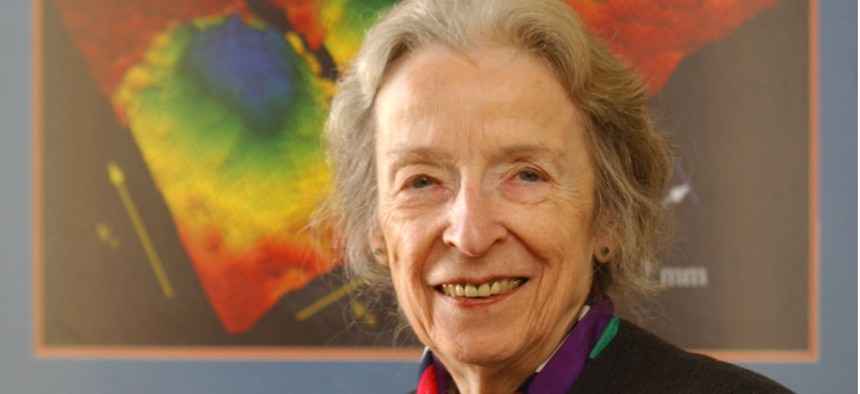
Katharine Blodgett Gebbie led the Physical Measurement Laboratory and its predecessor, the Physics Laboratory, at the National Institute of Standards and Technology for 21 years. Denease Anderson/NIST
An Extraordinary Fed: Katharine Blodgett Gebbie, 1932-2016
The astrophysicist and NIST lab director nurtured four Nobel laureates, two MacArthur "genius" grant awardees and countless world-class scientists.
She was a gifted scientist, an adventurer who piloted her own plane and a generous colleague with a weakness for good Scotch. America lost a true visionary this summer with the death of Katharine Blodgett Gebbie on Aug. 17—and the federal government lost one of the greatest managers any agency has even known.
An astrophysicist by training, Gebbie nurtured a remarkably accomplished group of scientists at the Commerce Department’s National Institute of Standards and Technology in a career that spanned decades.
I met Gebbie in the fall of 2002 when I interviewed her after she had been awarded a career achievement medal in the Service to America awards program, launched that year by Government Executive and the Partnership for Public Service. Within minutes, I was star-struck. Her graceful, kind manner and frail appearance belied a steeliness and sharp wit. She spoke of planetary nebulae, her passion for flying and the pleasures of Scotch. She was enormously proud of the scientists and staff at NIST.
By then, within the scientific community, she was widely recognized as an extraordinary leader and manager. Under her leadership at NIST’s Physics Laboratory, which later became the Physical Measurement Laboratory, two of the organization’s scientists, William Phillips and Eric Cornell, had won Nobel prizes for their work.
Donald Sullivan, then chief of the laboratory's Boulder-based Time and Frequency Division, told me at the time, "She's one of the gutsiest managers I've worked for.” Gebbie turned the Physics Laboratory into a world-class organization. By 2012, two more NIST scientists under her had joined the ranks of Nobel laureates: John Hall and David Wineland. The NIST public affairs office noted that Gebbie was a strong supporter of women and minorities in science, technology, engineering, and mathematics careers. Two world-renowned physicists who worked for and were mentored by her won MacArthur fellowships: Deborah Jin in 2003 and Ana Maria Rey in 2013.
How did she do it?
In a 2001 interview published in the science and technology newsletter at Bryn Mawr College, Gebbie’s alma mater, she was asked how she saw her role as a laboratory manager:
I guess I belong to what is known as the "plant-water-and-stand-clear" school of management—get the best people, steer them in the right direction, give them the resources they need, and let them run. It’s not politically correct, but I prefer to be judged on my results rather than my processes. I’ve been accused of supporting people, not programs, and to some extent it’s certainly true.
In the video below, some of her former colleagues demonstrate what made her “plant, water and stand clear” approach to management so extraordinary:







